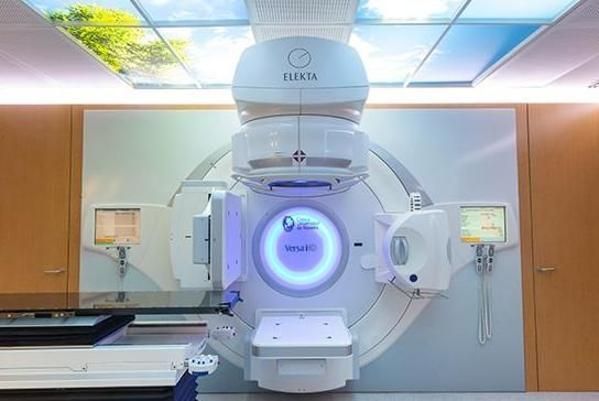(FM) Oncología
Departamento académico


New York University Langone Medical Center
Nueva York, Estados UnidosPublicaciones en colaboración con investigadores/as de New York University Langone Medical Center (20)
2024
-
Efficacy and safety of niraparib in patients aged 65 years and older with advanced ovarian cancer: Results from the PRIMA/ENGOT-OV26/GOG-3012 trial
Gynecologic Oncology, Vol. 187, pp. 128-138
-
Health-related quality of life in patients with newly diagnosed advanced ovarian cancer treated with niraparib vs placebo: Results from the phase 3 randomized PRIMA/ENGOT-OV26/GOG-3012 trial
Gynecologic Oncology, Vol. 184, pp. 168-177
-
Niraparib first-line maintenance therapy in patients with newly diagnosed advanced ovarian cancer: final overall survival results from the PRIMA/ENGOT-OV26/GOG-3012 trial
Annals of Oncology, Vol. 35, Núm. 11, pp. 981-992
-
Patterns of initial ovarian cancer recurrence on niraparib maintenance monotherapy in patients with no baseline evidence of disease after first-line chemotherapy: An ad hoc subgroup analysis of PRIMA/ENGOT-OV26/GOG-3012
Gynecologic Oncology, Vol. 189, pp. 68-74
-
Predictors of long-term progression-free survival in patients with ovarian cancer treated with niraparib in the PRIMA/ENGOT-OV26/GOG-3012 study
International journal of gynecological cancer : official journal of the International Gynecological Cancer Society, Vol. 34, Núm. 7, pp. 1041-1050
-
Progression-free survival and safety at 3.5 years of follow-up: results from the randomized phase 3 PRIMA/ENGOT-OV26/GOG-3012 trial of niraparib maintenance treatment in patients with newly diagnosed ovarian cancer–a plain language summary
Future Oncology, Vol. 20, Núm. 22, pp. 1531-1544
2023
-
Optimizing disease progression assessment using blinded central independent review and comparing it with investigator assessment in the PRIMA/ENGOT-ov26/GOG-3012 trial: challenges and solutions
International Journal of Gynecological Cancer, Vol. 33, Núm. 11, pp. 1733-1742
-
Progression-free survival and safety at 3.5 years of follow-up: results from the randomised phase 3 PRIMA/ENGOT-OV26/GOG-3012 trial of niraparib maintenance treatment in patients with newly diagnosed ovarian cancer
European Journal of Cancer, Vol. 189
2022
-
PD-L1 Crosslinking as a New Strategy of 4-1BB Agonism Immunotherapy
Clinical Cancer Research, Vol. 28, Núm. 15, pp. 3182-3184
-
Quality-adjusted time without symptoms of disease or toxicity and quality-adjusted progression-free survival with niraparib maintenance in first-line ovarian cancer in the PRIMA trial
Therapeutic Advances in Medical Oncology, Vol. 14
2021
-
Lifileucel, a Tumor-Infiltrating Lymphocyte Therapy, in Metastatic Melanoma
Journal of Clinical Oncology, Vol. 39, Núm. 24, pp. 2656-2666
-
Motixafortide and pembrolizumab combined to nanoliposomal irinotecan, fluorouracil, and folinic acid in metastatic pancreatic cancer: The COMBAT/ KEYNOTE-202 trial
Clinical Cancer Research, Vol. 27, Núm. 18, pp. 5020-5027
-
Siglec-15 as an emerging target for next-generation cancer immunotherapy
Clinical Cancer Research, Vol. 27, Núm. 3, pp. 680-688
2020
-
IL-18BP is a secreted immune checkpoint and barrier to IL-18 immunotherapy
Nature, Vol. 583, Núm. 7817, pp. 609-614
-
Niraparib in Patients With Newly Diagnosed Advanced Ovarian Cancer
Obstetrical and Gynecological Survey
-
PD-1 blockade in recurrent or metastatic cervical cancer: Data from cemiplimab phase I expansion cohorts and characterization of PD-L1 expression in cervical cancer
Gynecologic Oncology, Vol. 159, Núm. 2, pp. 322-328
2019
-
Expression analysis and significance of PD-1, LAG-3, and TIM-3 in human non-small cell lung cancer using spatially resolved and multiparametric single-cell analysis
Clinical Cancer Research, Vol. 25, Núm. 15, pp. 4663-4673
-
Niraparib in patients with newly diagnosed advanced ovarian cancer
New England Journal of Medicine, Vol. 381, Núm. 25, pp. 2391-2402
2017
-
Atezolizumab as first-line treatment in cisplatin-ineligible patients with locally advanced and metastatic urothelial carcinoma: a single-arm, multicentre, phase 2 trial
The Lancet, Vol. 389, Núm. 10064, pp. 67-76